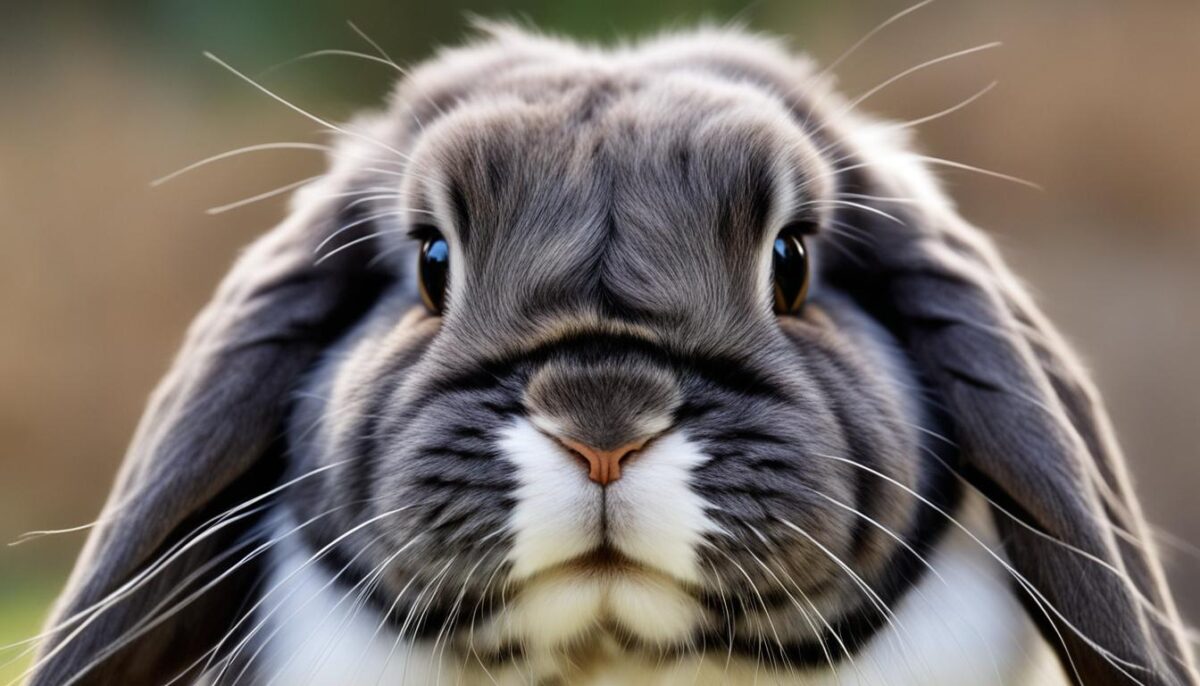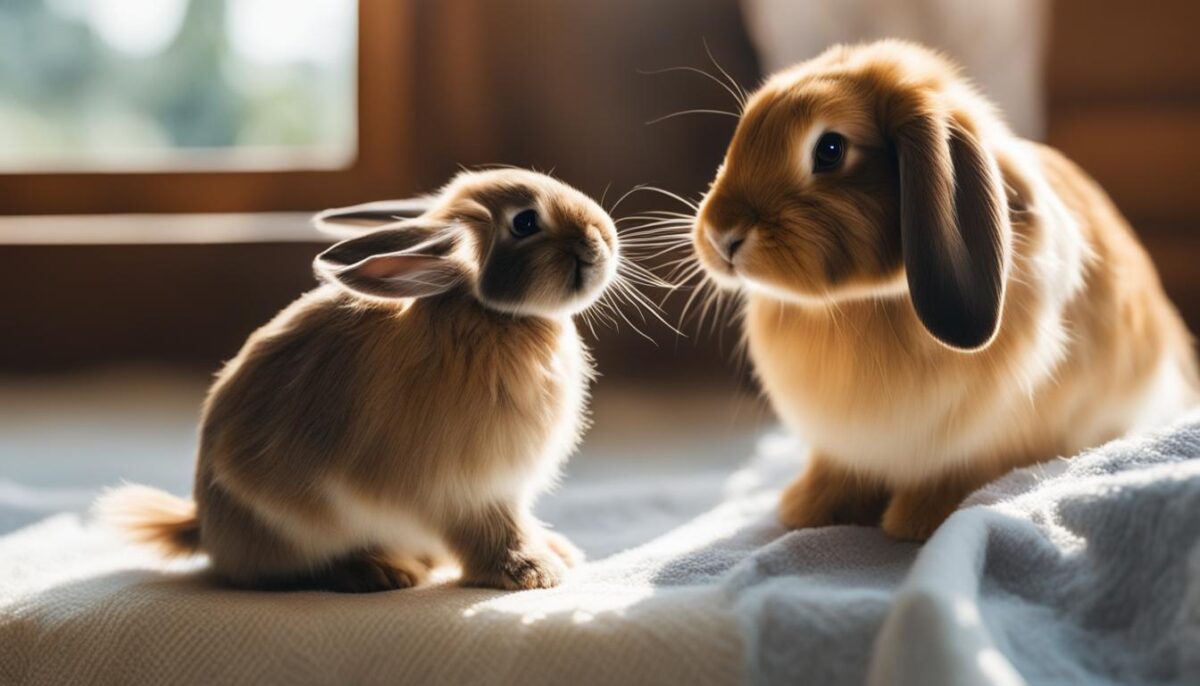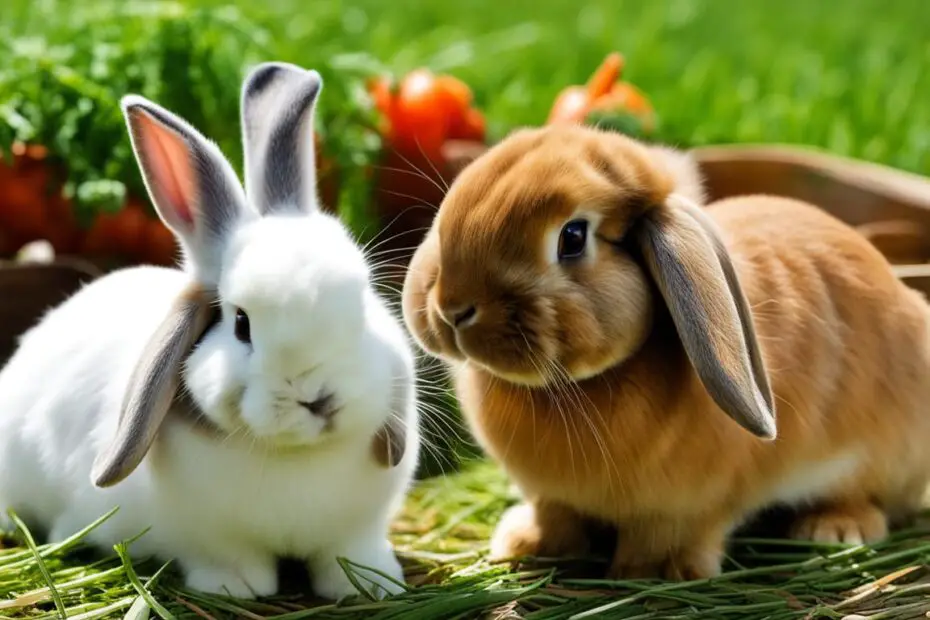Are you considering adding a Mini Lop rabbit to your family? These adorable creatures are known for their friendly and playful nature, making them a popular choice among pet owners. In this article, we will explore everything you need to know about the Mini Lop rabbit breed, including their care, size, and unique traits.
Key Takeaways:
- Mini Lop rabbits are friendly and playful pets.
- They come in various colors and have lopped ears.
- Mini Lops are small in size, weighing between 4.5 to 6.5 pounds.
- With proper care, they can live for 8 to 12 years.
- Mini Lops require nourishment, housing, companionship, exercise, and mental stimulation for a healthy and happy life.
Mini Lop Rabbit Characteristics and Appearance
Mini Lop rabbits are known for their adorable appearance. They have lopped ears, a button nose, and big eyes. Their size is smaller than other lop breeds but may be larger than Holland Lops. They come in a variety of colors recognized by the American Rabbit Breeders Association (ARBA). Mini Lops have a compact, stocky body shape with dense fur.
Mini Lops are characterized by their lopped ears, which hang down on the sides of their head, giving them a distinctive look. This feature adds to their cuteness and sets them apart from other rabbit breeds. The adorable button nose and big eyes of Mini Lop rabbits make them even more endearing.
In terms of size, Mini Lops are smaller compared to other lop breeds such as the French Lop or the English Lop. However, they may be larger than Holland Lops, another popular rabbit breed. Despite their smaller size, Mini Lops have a compact and stocky body shape, which adds to their charm.
The Mini Lop breed is known for its diverse range of colors. The American Rabbit Breeders Association recognizes various colors for Mini Lops, including but not limited to:
- Black
- Blue
- Chocolate
- Tortoise Shell
- Orange
The colors and patterns of Mini Lop rabbits make them visually appealing and captivating pets. Whether you prefer a solid color or a combination of shades, there is a Mini Lop color to suit every taste and preference.
The dense fur of Mini Lop rabbits adds to their overall appearance. Their coats are soft and velvety, inviting cuddles and gentle strokes. Regular grooming is essential to maintain the health and beauty of their fur.

Mini Lop Rabbit Appearance Summary:
| Characteristic | Description |
|---|---|
| Lopped Ears | Distinctive feature with ears hanging down |
| Button Nose | Cute and adorable nose |
| Big Eyes | Expressive and captivating eyes |
| Size | Smaller than other lop breeds, but larger than Holland Lops |
| Color | Wide range of colors recognized by ARBA |
| Body Shape | Compact and stocky |
| Fur | Dense and soft, requiring regular grooming |
Mini Lop Rabbit Care and Grooming
Proper care and grooming are essential for the health and well-being of Mini Lop rabbits. By following a regular grooming routine, you can help maintain their dense fur and prevent excessive shedding. Additionally, providing adequate care ensures that your beloved Mini Lop stays happy and comfortable.
Here are some important care and grooming practices to keep in mind:
- Cleaning: Mini Lops require regular cleaning of their eyes, ears, nose, and mouth to prevent any potential infections or irritations. Use a soft cloth or cotton ball soaked in lukewarm water to gently clean these areas. Be careful not to get water directly inside their ears.
- Fur Maintenance: To minimize fur matting and remove loose hair, give your Mini Lop regular brushings. Use a soft bristle brush or a rabbit-specific grooming tool to gently comb through their fur. This helps prevent hairballs and keeps their coat looking clean and healthy.
- Toenail Trimming: Trim your Mini Lop’s toenails regularly to prevent them from becoming overgrown or causing discomfort. Use a small animal nail trimmer designed for rabbits and ensure you only cut the tip, avoiding the quick (the sensitive part of the nail). If you are unsure about how to trim their nails, consult a veterinarian or a professional groomer.
- Veterinary Care: Regular veterinary check-ups are crucial for maintaining your Mini Lop’s health. Your vet can provide vaccinations and perform necessary examinations to ensure your rabbit is in good condition. They can also offer guidance on specific care needs based on your Mini Lop’s individual health requirements.
- Diet: A well-balanced diet is essential for the overall health of Mini Lop rabbits. Feed them a combination of high-quality hay, fresh vegetables, and rabbit pellets or feed. Ensure they have access to fresh water at all times.
- Housing and Exercise: Provide your Mini Lop with a clean, well-ventilated housing that offers enough space for them to move around comfortably. Regular exercise is crucial for their physical and mental well-being. Allow supervised time outside their enclosure for them to hop around and explore their surroundings.
| Care and Grooming Summary: |
|---|
| Regular cleaning of eyes, ears, nose, and mouth |
| Frequent brushings to prevent fur matting |
| Trimming toenails regularly |
| Regular veterinary check-ups and vaccinations |
| Providing a balanced diet of hay, vegetables, and rabbit feed |
| Clean, well-ventilated housing with ample exercise space |
By following these care and grooming practices, you can ensure that your Mini Lop rabbit lives a happy, healthy, and comfortable life. Remember, each Mini Lop is unique, so it’s essential to provide individualized attention and observe their specific needs for optimal care.

Mini Lop Rabbit Health Concerns
When it comes to mini lop rabbits, it’s important to be aware of their potential health concerns. These adorable creatures can be prone to a few specific issues that require attention and proper care. By understanding these health concerns, you can ensure that your mini lop stays happy and healthy for years to come.
1. Ear Problems
Mini lop rabbits have long ears, which can sometimes lead to ear problems. These can include ear infections and mite infestations. It’s essential to regularly check your rabbit’s ears for any signs of redness, irritation, discharge, or excessive scratching. If you notice any of these symptoms, consult a veterinarian for diagnosis and treatment.
2. Respiratory Infection
Another common health concern for mini lop rabbits is respiratory infection. These infections can be caused by bacterial or viral agents and may result in symptoms such as sneezing, coughing, nasal discharge, or difficulty breathing. If you notice any respiratory issues, seek veterinary care promptly to prevent further complications.
3. Gastrointestinal Stasis
Gastrointestinal stasis, also known as a slow gut or a “gut shutdown,” is a serious condition that mini lop rabbits can experience. It occurs when their digestion slows down or stops altogether, resulting in a lack of appetite, bloating, or even complete loss of bowel movements. This condition requires immediate veterinary attention to prevent further complications.
4. Dental Issues
Mini lop rabbits, like many other rabbit breeds, are prone to dental issues. Their teeth continuously grow, and if not properly worn down, they can lead to problems such as overgrowth, malocclusion, or spurs. Regular dental check-ups and a diet that includes plenty of hay to chew on can help prevent these issues.
By being aware of these health concerns and providing your mini lop rabbit with regular veterinary care, a balanced diet, and a clean living environment, you can ensure that they have the best chance of living a long and healthy life. Remember, prevention is key, so always be proactive in monitoring your mini lop’s health and addressing any concerns that may arise.
Conclusion
In conclusion, Mini Lop rabbits are a popular breed choice among pet owners. Their friendly nature and adorable appearance make them delightful companions. However, it is important to provide them with proper care, grooming, and a balanced diet. Regular veterinary check-ups are crucial to ensure their well-being and detect any potential health issues early on.
By giving Mini Lop rabbits the right care and attention, they can live happy and healthy lives for many years. Their playful personalities and cute features bring joy to both children and adults alike. Whether you are a seasoned rabbit owner or considering getting a pet for the first time, Mini Lop rabbits are a wonderful choice.
Remember, Mini Lop rabbits rely on their owners to provide them with a suitable environment and the love they need. With the right resources and knowledge, you can enjoy the rewarding experience of caring for these affectionate and precious creatures.
FAQ
What is a Mini Lop rabbit?
A Mini Lop rabbit is a popular breed known for its friendly and playful nature. They are small in size and have lopped ears. They come in various colors and have a compact, stocky body shape.
How big do Mini Lop rabbits get?
Mini Lop rabbits typically weigh between 4.5 to 6.5 pounds when fully grown. They are smaller in size compared to other lop breeds, but may still be larger than Holland Lops.
How long do Mini Lop rabbits live?
Mini Lop rabbits have a lifespan of 8 to 12 years with proper care and attention.
What kind of care do Mini Lop rabbits need?
Mini Lop rabbits require proper nourishment, housing, companionship, exercise, and mental stimulation. They should have a balanced diet, clean and well-ventilated housing, and regular veterinary check-ups.
What colors do Mini Lop rabbits come in?
Mini Lop rabbits come in a variety of colors recognized by the American Rabbit Breeders Association (ARBA). These include but are not limited to, black, white, brown, gray, and tortoiseshell.
What are the common health concerns for Mini Lop rabbits?
Mini Lop rabbits are prone to ear problems, respiratory infections, gastrointestinal stasis, hairball obstructions, and dental issues. Regular veterinary care and a clean living environment are important for their well-being.


